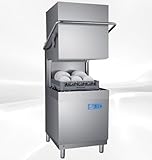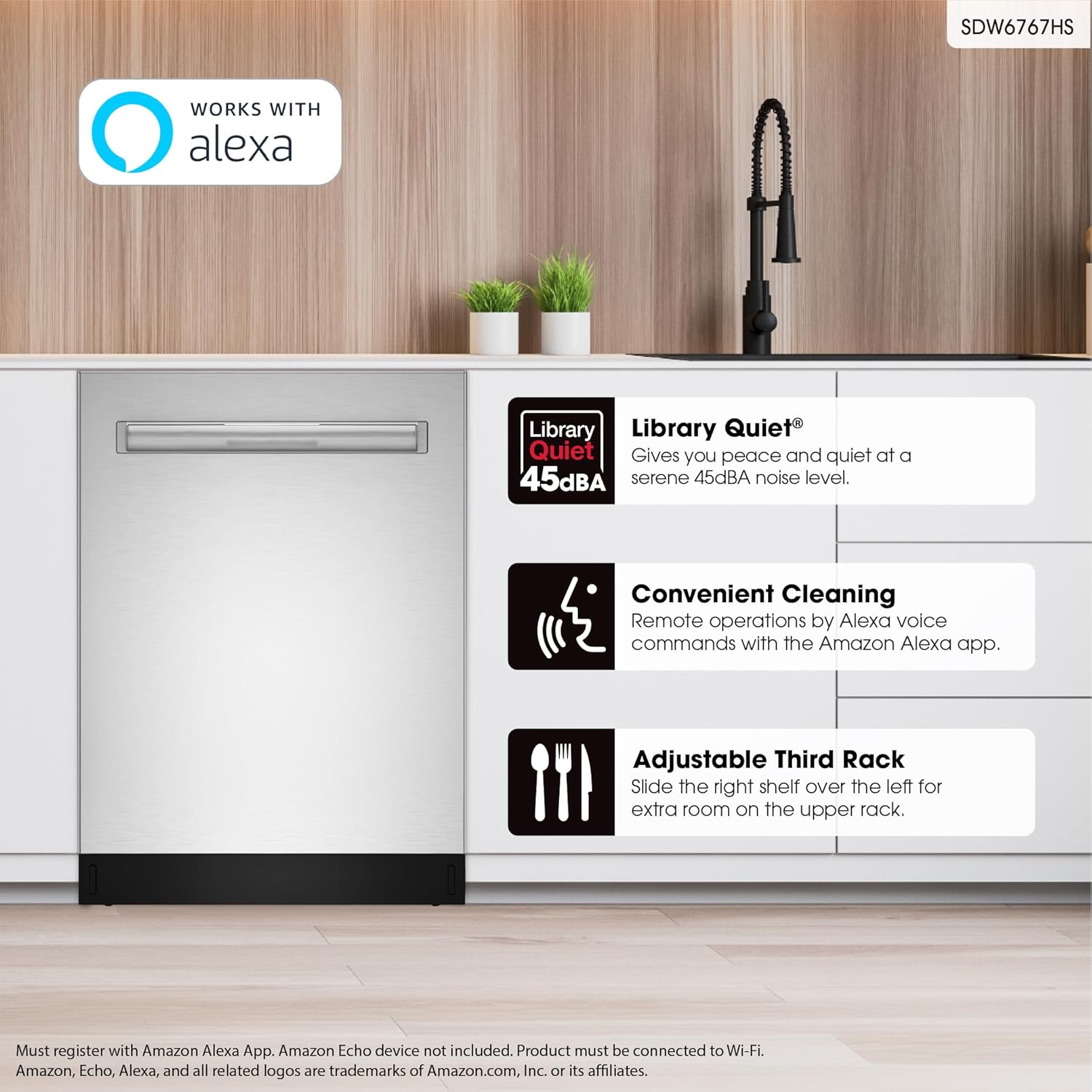Imagine walking into your kitchen after a chaotic dinner rush. The steam has cleared. Your countertops are gleaming. Your dishwasher hums softly, a trusted teammate who never quits. Now, picture the opposite: a mountain of dirty racks, puddles on the floor, and your staff in a full-blown panic.
This isn’t just about clean plates. It’s about a calm kitchen. The wrong machine costs you money, time, and sanity. But don’t worry. I’m here to guide you through choosing the best commercial dishwasher for your business. Relief is just a few paragraphs away.
Keynote: Best Commercial Dishwashers
Choosing the best commercial dishwasher boosts your kitchen’s efficiency. Match the machine’s capacity to your peak demand, selecting from undercounter, door-type, or conveyor models. High-temperature units offer powerful, chemical-free sanitizing. Brands like Hobart and Jackson lead the market in 2025 with reliable, high-performance options for any business.
Why Your Dishwasher Choice Will Make or Break Your Day
A “good enough” dishwasher is a profit killer in disguise. It quietly wastes water and energy, driving up your utility bills. Then come the surprise repair calls right in the middle of a Friday night service. Those costs add up fast.
I’ve heard the horror stories. A steam leak warps a brand-new cabinet. Racks get so backed up that the kitchen grinds to a halt. You see rusty spots on your “clean” forks. Or worse, the health inspector points out that your dishes aren’t being properly sanitized. These are red flags that you bought the wrong machine.
First, Let’s Talk About YOUR Kitchen
Let’s get personal. How many dishes are you washing on your busiest night? Don’t just think in plates. Think in racks per hour. This is the single most important number you need to know. It tells you how much speed and power your kitchen truly requires.
Next, grab a tape measure. Be ruthless. Measure the height, width, and depth of your available space. Will the door swing open without hitting anything? Is there enough room for staff to load and unload? A good layout helps your team glide like dancers, not bump into each other. As one chef told me, “The right machine doesn’t just clean—it calms your chaos.”
Undercounter vs. Door-Type vs. Conveyor: Which Saves Your Sanity?
Choosing the right size is your first big decision. Each type of commercial dishwasher is built for a different level of kitchen madness. Picking the right one ensures you have the power you need without overspending on a machine that’s too big for your space.
| Type | Racks per Hour | Perfect For |
| Undercounter | 20–40 | Cafes, bars, small bistros |
| Door-Type | 40–75 | Bustling full-service restaurants |
| Conveyor | 200+ | Hotels, schools, hospitals, large-scale catering |
| Glasswasher | 750–1,400 glasses/hr | Pubs, wine bars, busy cocktail lounges |
An undercounter commercial dishwasher is a hero for tight spaces. A door-type is the reliable workhorse for most restaurants. A conveyor system is for when you’re in beast mode, serving hundreds of people. And if you serve a lot of drinks, a dedicated glasswasher is your crystal’s best friend.
High-Temp vs. Low-Temp: The Sanitizing Smackdown
How your dishwasher sanitizes dishes is a huge deal. It affects your costs, your results, and your health inspection scores. You have two main choices: heat or chemicals.
High-Temperature Sanitizing
A high-temperature dishwasher uses scorching hot water to get the job done. It blasts dishes with a final rinse of at least 180°F. This intense heat kills germs without any chemical sanitizers.
The biggest plus? Dishes flash-dry in seconds from the residual heat. This gets them back into service faster. The trade-off is a slightly higher energy bill, as the machine’s booster heater works to get the water that hot. A commercial high temp dishwasher is the top choice for most restaurants.
Low-Temperature Sanitizing
A low-temperature dishwasher washes dishes at a cooler 120-140°F. It uses chemical sanitizers in the final rinse to kill bacteria. This process is gentler on delicate glassware and uses less energy.
However, you have to buy the chemicals continuously, which is an ongoing cost. Staff must also remember to refill the sanitizer and rinse aids. The chemicals can sometimes leave a residue that affects the taste of drinks, a major concern for bars.
No matter which you choose, make sure it is NSF certified. NSF International sets the public health standards for safety and sanitation. Your health inspector will look for that seal.
Energy Hacks That Slash Your Bills
A modern dishwasher can be a surprising money-saver. Smart technology now helps you cut down on utility costs every single day. These features go way beyond the sticker price, lowering your Total Cost of Ownership.
Look for a machine with heat recovery technology. This brilliant feature captures the hot steam from a wash cycle. It then uses that “free” energy to preheat the water for the next cycle. This can save you hundreds, even thousands, of dollars a year on energy.
Also, always look for the Energy Star label. An Energy Star rated commercial dishwasher is certified to use significantly less water and energy than standard models. Many ventless models with heat recovery even eliminate the need for an expensive overhead ventilation hood, saving you a fortune on installation.
Top Models 2026: Stress-Tested for Real Kitchens
I’ve looked at the data and the user reviews. These are the models that stand out for their performance, reliability, and value in 2025.
Small-Space Superstar: Jackson DishStar HT-E-SEER
This undercounter model is a top pick for cafes and small restaurants. It’s an Energy Star qualified high-temp machine that washes 20 racks per hour using just 0.65 gallons of water per rack. It features steam elimination, making it a great choice for tight spaces.
Mid-Size Marvel: Hobart AM16 Ventless
When you need more power, the Hobart AM16 door-type series is a market leader. The ventless model uses heat recovery to save energy and eliminate the need for a hood. For very busy kitchens, the version with Automatic Soil Removal (ASR) actively filters food out of the wash water. This saves huge amounts of labor on pre-scrapping.
High-Volume Hero: Champion 44-PRO
For schools, hotels, or banquet halls, a conveyor dishwasher is a must. The Champion 44-PRO can wash over 200 racks per hour. It has an advanced touchscreen controller with built-in diagnostics to keep you running smoothly and avoid costly downtime.
Budget Gem: CMA Dishmachines E-AH
If you need a reliable door-type machine without a premium price tag, this CMA Dishmachines model is a strong contender. It washes 40 racks per hour, is Energy Star qualified, and earns high marks from users for its straightforward performance and value.
Pub? Bistro? Catering? Match Your Machine to Your Madness
The best commercial dishwasher for a bar is different from one for a catering hall. Your business type dictates your needs.
- Pubs and Bars: Your priority is sparkling, spot-free glassware. A dedicated high-temp undercounter glasswasher is a smart investment. It’s gentle on delicate stems but fierce on lipstick stains.
- Fast-Casual & Bistros: Speed is everything during the lunch rush. An efficient undercounter or small door-type dishwasher with a cycle time under two minutes will prevent a bottleneck in your kitchen.
- Large Restaurants & Catering: Volume and labor savings are key. A door-type model with soil removal or a full conveyor system is your best bet. These machines are built for the constant flow of a high-volume warewashing operation.
Dodge These 4 Costly Blind Spots
Avoid buyer’s remorse by thinking through these common pitfalls before you sign the check.
- Ignoring Installation Needs: Do you have the right power? Most high-temp machines need a 208V or 240V electrical circuit, not a standard wall outlet. Do you have proper drainage and hot water access? Crucially, does your water quality require a water filtration system to prevent scale buildup?
- Underestimating Noise: A loud dishwasher can ruin the atmosphere of an open kitchen and make communication difficult for staff. Look for models that operate below 60 decibels for a more peaceful workplace.
- Forgetting Total Cost of Ownership (TCO): The cheapest machine upfront is rarely the cheapest in the long run. Calculate the five-year cost, including water, energy, chemicals, and potential repairs. A slightly more expensive, efficient machine often saves you thousands over its lifetime.
- Skipping the Warranty & Service Check: What does the warranty cover, and for how long? More importantly, is there a reliable, factory-authorized service technician for that brand in your area? The most reliable commercial dishwasher brand for you is one you can get fixed quickly.
Your “No-Regrets” Checklist
Ready to make a choice? Run through this final checklist.
- [ ] Have you confirmed your required racks per hour?
- [ ] Have you chosen between high-temp and low-temp sanitizing?
- [ ] Does the machine have NSF certification?
- [ ] Have you budgeted for installation, utilities, and potential water filtration?
- [ ] Have you considered the machine’s noise level?
- [ ] Does the warranty cover at least 3-5 years, and is local service available?
Breathe deep. Your perfect dishwasher is waiting.
Conclusion
Choosing the best commercial dishwasher is about more than just technology. It’s about investing in a smoother workflow, a happier staff, and a calmer kitchen. It’s a choice that pays you back every single day in reliability and efficiency.
You’re not just buying a machine; you’re buying peace of mind. Think of it as a silent partner that works tirelessly so you can focus on what you do best: creating amazing experiences for your guests. You have the roadmap now. Go find your kitchen’s perfect match.
Best Commercial Dishwashers (FAQs)
What is the best make of commercial dishwasher?
There isn’t one single “best” brand for everyone, as the ideal choice depends on your specific needs and budget. However, three brands consistently stand out for their reliability and performance.
Hobart is widely considered the industry benchmark for durability and innovation, especially in the door-type and conveyor categories.
Jackson is highly acclaimed for its rugged, powerful, and reliable machines across all types.
CMA Dishmachines is known for offering durable, American-made machines that provide excellent value and unique features.
What dishwasher do restaurants use?
Restaurants select dishwashers based on their daily dish volume and kitchen space. Common types include undercounter, door-type, and large conveyor systems. Brands like Hobart, Jackson, and CMA are industry standards in professional kitchens. Most establishments prefer high-temperature models for their powerful, chemical-free sanitizing.
How do I choose a commercial dishwasher?
First, calculate your busiest service’s dish load to find your racks-per-hour needs. Measure your kitchen space accurately to ensure the unit will fit properly. Choose between high-temperature heat sanitizing or low-temperature chemical models. Always confirm the dishwasher is NSF certified to meet health department standards.
What is the life expectancy of a commercial dishwasher?
The average life expectancy of a commercial dishwasher is about 10 to 15 years. This lifespan depends on the machine’s daily usage and maintenance schedule. Consistent daily cleaning and regular professional servicing significantly extend its operational life. Water quality also plays a key role in the machine’s long-term durability.
What are the different types of commercial dishwashers suitable for small diners versus larger establishments?
Small diners often use compact, single rack upright dishwashers for their kitchen operations. Larger establishments might choose door type dishwashers or conveyor-style rack dishwashers. Understanding the different types helps you pick the right dishwasher.
How does a low temperature dish machine complete its cleaning process effectively?
A low temperature washer uses a specific chemical detergent instead of relying on high heat. The wash arms spray this solution during the cycle, and the water temperature remains lower. This cleaning process still ensures you get clean dishes.
What info helps you choose the right commercial dishwasher for handling peak hours?
To make an informed decision, determine how many racks of dishes you are loading during peak hours. Reading customer reviews provides great info on the best options. This helps you select the right dishwasher for your needs.
Are there specialized washers for utensils and glass dishware, and what are they made of?
Yes, dedicated glass washers and utensil washers handle delicate items and specific utensils. These often come with accessories like custom dish racks for specific dishware. Most are made of durable stainless steel for easy access and cleaning.
What should I consider about plumbing and energy consumption for any new type of dishwasher?
Proper plumbing is essential for any new washer to get clean water on a regular basis. You should evaluate the energy consumption of the dish machine to control operational costs. Even a compact appliance needs correct plumbing for efficient dishwashing.

Katie Lee has over 20 years of experience in the kitchen. She helps homeowners find the right appliances for their needs to sets up a perfect kitchen system. She also shares helpful tips and tricks for optimizing appliance performance.





